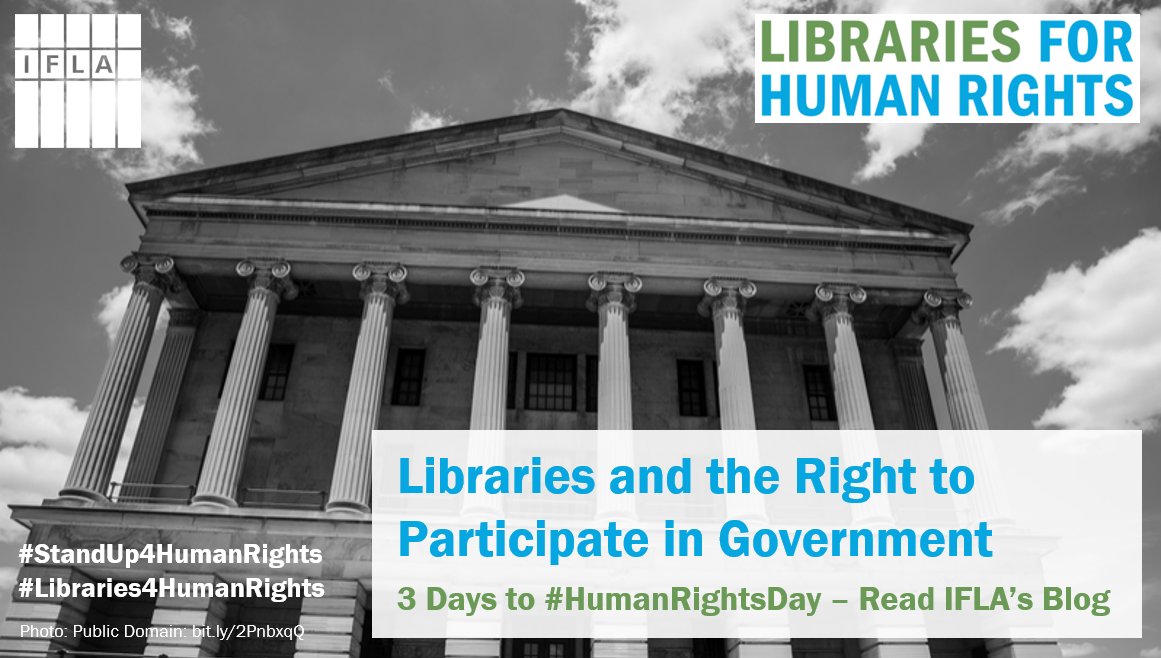
For the fifth in our series of blogs looking at different articles from the Universal Declaration of Human Rights, today’s contribution looks at the right to participate in government. It shows how libraries, by providing access to information – and helping people to use it – can support an active and engaged citizenry.
One of the key definitions of freedom is the possibility to take decisions about yourself – what you think, say, and do.
However, it is clear that we cannot leave everything up to individuals. Humans need to work together in order to achieve common goals. Progress in health and education would not be possible in a purely individualistic society. Neither, many would argue, would be security.
Working together implies that decisions need to be taken on behalf of the group. This is the role that governments play, at least when the ‘group’ is the people living in (or coming from) a particular country, region or area.
Government therefore implies a restriction on individual freedoms, which is what makes the right to participate so important. As Article 21 of the Universal Declaration of Human Rights underlines, ‘Everyone has the right to take part in the government of his country’.
Information plays a role in this, as some very interesting research from Nigeria at the World Library and Information Congress has demonstrated, with a clear link between a feeling of being well informed and a readiness to engage in elections.
So how can libraries help with this. This blog sets out two ways.
Delivering Information
A first – and fundamental – contribution is simply to making information available. Government information and parliamentary libraries in particular play a vital role here, bringing together official publications and laws into one place.
This supports the work of researchers trying to understand the processes and forces at work in government. But it can also make them into gateways for public information.
Indeed, Finland’s Parliamentary Library has been tasked since 1908 with also acting as a ‘public central library’.
These ideas have spread. For example, in Zimbabwe and Japan, parliamentary libraries have a deliberate policy of making sure that centres at the local level – often public libraries – receive copies of key documents, or have access to the most important databases.
It is also more and more broadly accepted that the public should have access to briefings prepared for Members of Parliament in order to inform their decision-making. The Library of Congress’s Congressional Research Service has been a high-profile recent example of an institution starting to do this.
In effect, libraries are working to ensure that people are at least as well informed as lawmakers. This is an essential step towards participation in government.
Making it Usable
Yet, simply making information available is not enough in itself. The work of governments is complex, and often technical.
Additional effort can be necessary to help people find their way, especially for people who do not have the time that elected representatives or officials may have to engage.
Libraries are also active here, drawing on experiences of helping users engage most effectively with the information they have. This can go from improving the presentation of databases and documentation to make it more user friendly, to forming partnerships with public libraries to build capacity to explain them.
In Taiwan, for example, libraries proactively worked to give access to information at a time of protests in Taipei, in order to help people understand the issues and engage in debate.
Libraries are also helping promote transparency more broadly, for example through publishing live voting information, or even through running consultations with citizens. This creates new possibilities for individuals to hold those taking decisions on their behalf to account.
Libraries can provide important support for the realisation of the right to participate in government through meaningful access to information. Of course, they can also go further – American libraries were active in encouraging people to register to vote ahead of the recent mid-term elections.
At the same time, their – and their users’ – interests themselves need to be represented and protected.
From unjustified cuts to services to bad copyright laws or censorship, libraries need also to be heard in decision-making processes. IFLA works hard to do this, and, in line with the Global Vision Summary Report, encourages every librarian to be an advocate.
Read more about these themes in our article on access to information and democracy, and in our brief on libraries and good governance.